MGMT 314 - Semester 2: Analysis of Identity Theories
VerifiedAdded on 2022/09/25
|9
|2604
|48
Essay
AI Summary
This assignment provides an analysis of three prominent theories of identity: Social Identity Theory, Narrative Identity Theory, and Identity Theory. The essay begins with an introduction that explains the relevance of these theories in understanding individual and group behavior within organizational settings. Social Identity Theory, as framed by Tajfel, examines how group membership influences self-perception and behavior. Narrative Identity Theory focuses on the role of personal life stories in shaping identity, exploring how past experiences and their narration contribute to an individual's self-understanding. Identity Theory delves into the relationship between mind and body, exploring how mental processes and experiences influence behavior and identity. The essay discusses each theory's key concepts, providing examples to illustrate their practical applications in understanding human behavior in various contexts. The conclusion synthesizes the key insights from these theories, emphasizing the complexity of identity formation and its significance in organizational and personal life.

Theoretical approaches related to individual identity
Paraphrase This Document
Need a fresh take? Get an instant paraphrase of this document with our AI Paraphraser
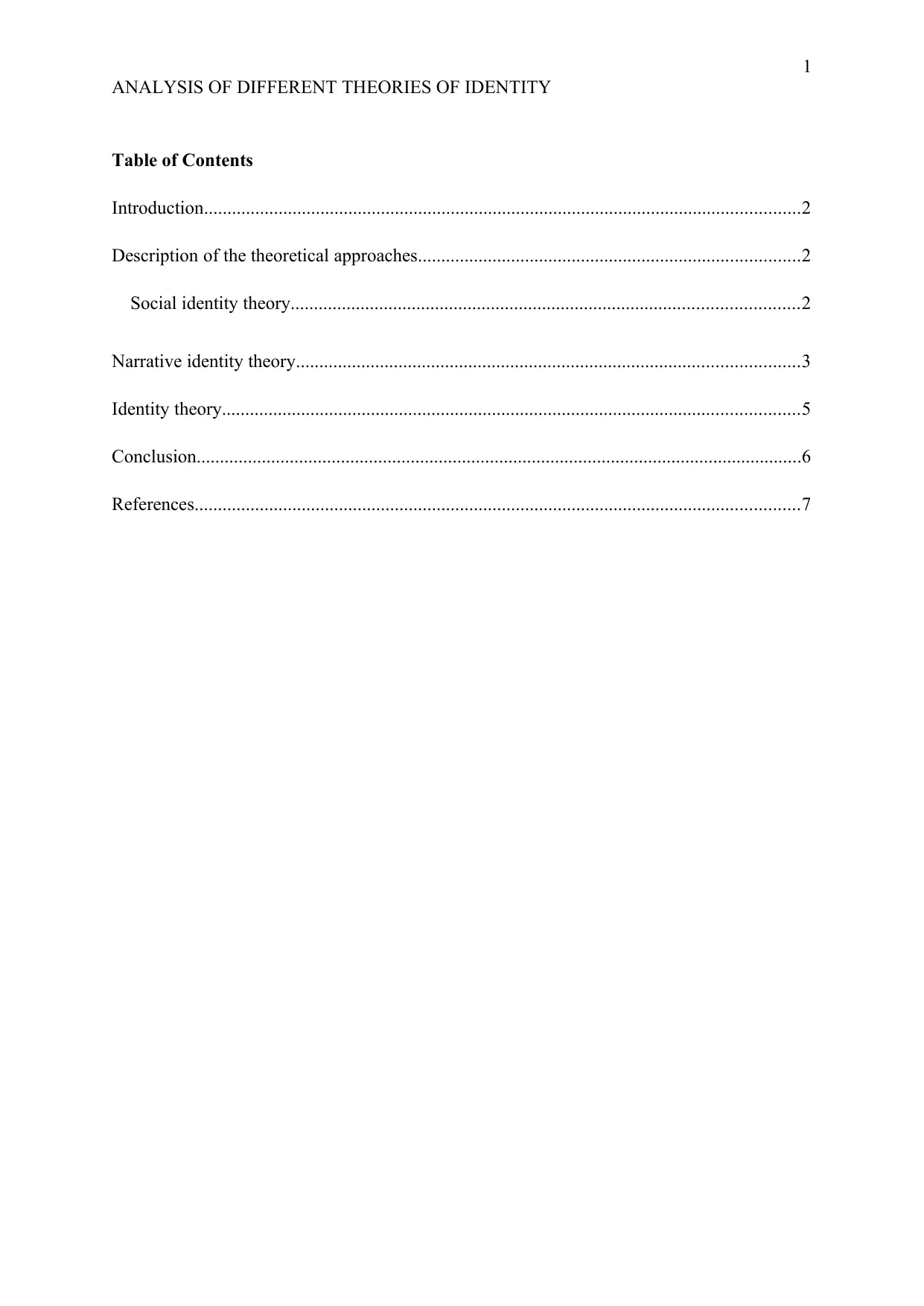
1
ANALYSIS OF DIFFERENT THEORIES OF IDENTITY
Table of Contents
Introduction................................................................................................................................2
Description of the theoretical approaches..................................................................................2
Social identity theory.............................................................................................................2
Narrative identity theory............................................................................................................3
Identity theory............................................................................................................................5
Conclusion..................................................................................................................................6
References..................................................................................................................................7
ANALYSIS OF DIFFERENT THEORIES OF IDENTITY
Table of Contents
Introduction................................................................................................................................2
Description of the theoretical approaches..................................................................................2
Social identity theory.............................................................................................................2
Narrative identity theory............................................................................................................3
Identity theory............................................................................................................................5
Conclusion..................................................................................................................................6
References..................................................................................................................................7
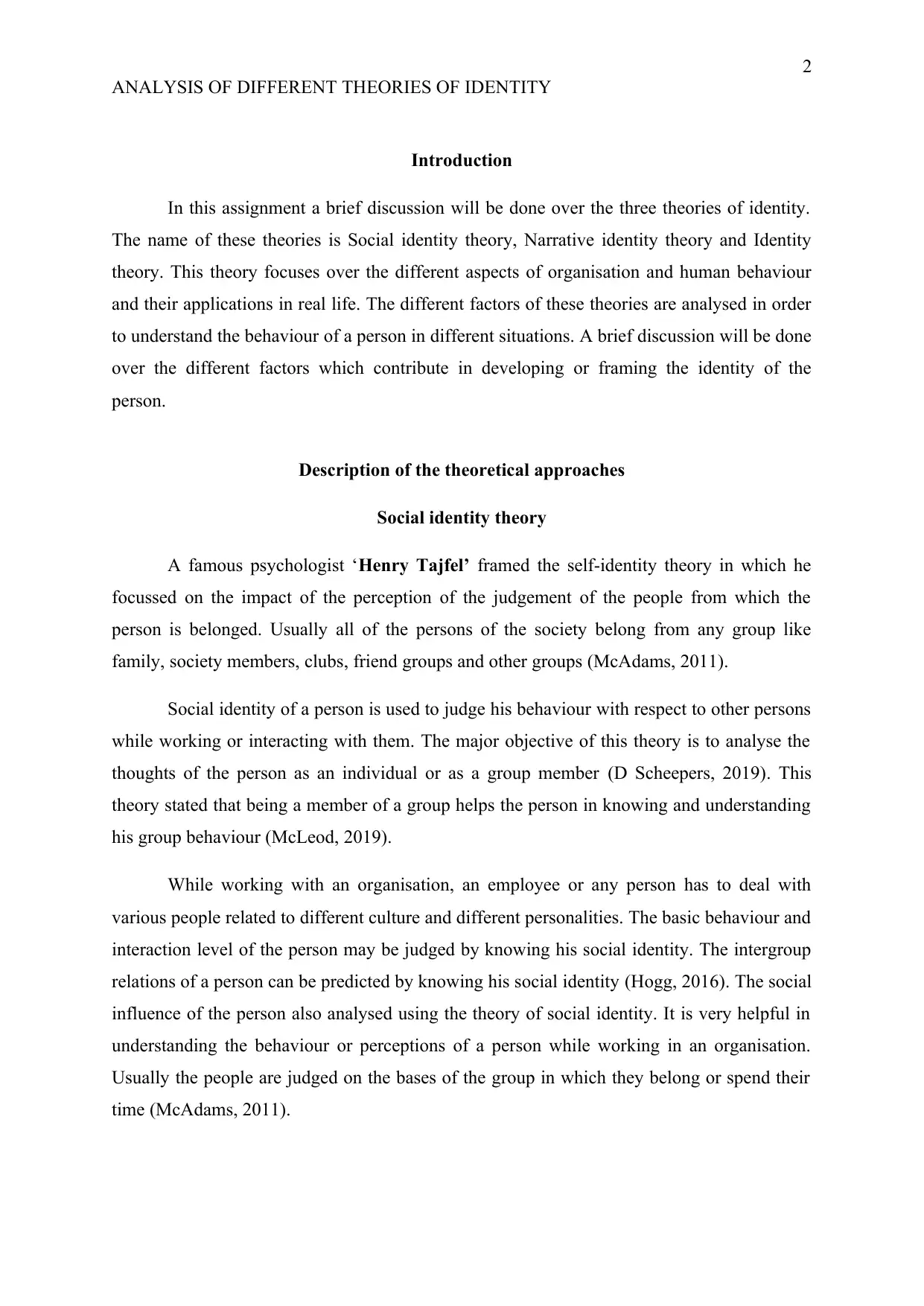
2
ANALYSIS OF DIFFERENT THEORIES OF IDENTITY
Introduction
In this assignment a brief discussion will be done over the three theories of identity.
The name of these theories is Social identity theory, Narrative identity theory and Identity
theory. This theory focuses over the different aspects of organisation and human behaviour
and their applications in real life. The different factors of these theories are analysed in order
to understand the behaviour of a person in different situations. A brief discussion will be done
over the different factors which contribute in developing or framing the identity of the
person.
Description of the theoretical approaches
Social identity theory
A famous psychologist ‘Henry Tajfel’ framed the self-identity theory in which he
focussed on the impact of the perception of the judgement of the people from which the
person is belonged. Usually all of the persons of the society belong from any group like
family, society members, clubs, friend groups and other groups (McAdams, 2011).
Social identity of a person is used to judge his behaviour with respect to other persons
while working or interacting with them. The major objective of this theory is to analyse the
thoughts of the person as an individual or as a group member (D Scheepers, 2019). This
theory stated that being a member of a group helps the person in knowing and understanding
his group behaviour (McLeod, 2019).
While working with an organisation, an employee or any person has to deal with
various people related to different culture and different personalities. The basic behaviour and
interaction level of the person may be judged by knowing his social identity. The intergroup
relations of a person can be predicted by knowing his social identity (Hogg, 2016). The social
influence of the person also analysed using the theory of social identity. It is very helpful in
understanding the behaviour or perceptions of a person while working in an organisation.
Usually the people are judged on the bases of the group in which they belong or spend their
time (McAdams, 2011).
ANALYSIS OF DIFFERENT THEORIES OF IDENTITY
Introduction
In this assignment a brief discussion will be done over the three theories of identity.
The name of these theories is Social identity theory, Narrative identity theory and Identity
theory. This theory focuses over the different aspects of organisation and human behaviour
and their applications in real life. The different factors of these theories are analysed in order
to understand the behaviour of a person in different situations. A brief discussion will be done
over the different factors which contribute in developing or framing the identity of the
person.
Description of the theoretical approaches
Social identity theory
A famous psychologist ‘Henry Tajfel’ framed the self-identity theory in which he
focussed on the impact of the perception of the judgement of the people from which the
person is belonged. Usually all of the persons of the society belong from any group like
family, society members, clubs, friend groups and other groups (McAdams, 2011).
Social identity of a person is used to judge his behaviour with respect to other persons
while working or interacting with them. The major objective of this theory is to analyse the
thoughts of the person as an individual or as a group member (D Scheepers, 2019). This
theory stated that being a member of a group helps the person in knowing and understanding
his group behaviour (McLeod, 2019).
While working with an organisation, an employee or any person has to deal with
various people related to different culture and different personalities. The basic behaviour and
interaction level of the person may be judged by knowing his social identity. The intergroup
relations of a person can be predicted by knowing his social identity (Hogg, 2016). The social
influence of the person also analysed using the theory of social identity. It is very helpful in
understanding the behaviour or perceptions of a person while working in an organisation.
Usually the people are judged on the bases of the group in which they belong or spend their
time (McAdams, 2011).
⊘ This is a preview!⊘
Do you want full access?
Subscribe today to unlock all pages.

Trusted by 1+ million students worldwide
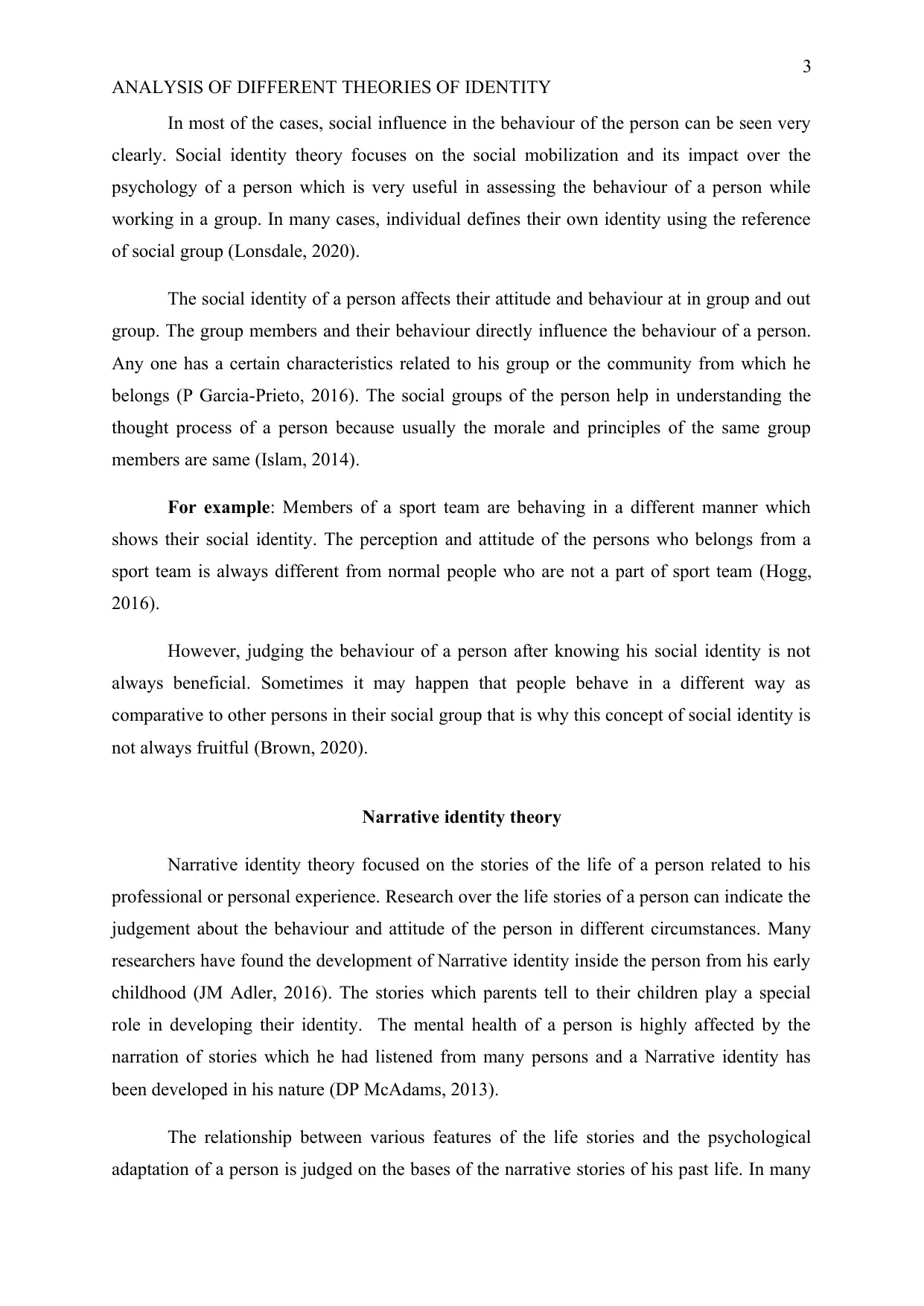
3
ANALYSIS OF DIFFERENT THEORIES OF IDENTITY
In most of the cases, social influence in the behaviour of the person can be seen very
clearly. Social identity theory focuses on the social mobilization and its impact over the
psychology of a person which is very useful in assessing the behaviour of a person while
working in a group. In many cases, individual defines their own identity using the reference
of social group (Lonsdale, 2020).
The social identity of a person affects their attitude and behaviour at in group and out
group. The group members and their behaviour directly influence the behaviour of a person.
Any one has a certain characteristics related to his group or the community from which he
belongs (P Garcia-Prieto, 2016). The social groups of the person help in understanding the
thought process of a person because usually the morale and principles of the same group
members are same (Islam, 2014).
For example: Members of a sport team are behaving in a different manner which
shows their social identity. The perception and attitude of the persons who belongs from a
sport team is always different from normal people who are not a part of sport team (Hogg,
2016).
However, judging the behaviour of a person after knowing his social identity is not
always beneficial. Sometimes it may happen that people behave in a different way as
comparative to other persons in their social group that is why this concept of social identity is
not always fruitful (Brown, 2020).
Narrative identity theory
Narrative identity theory focused on the stories of the life of a person related to his
professional or personal experience. Research over the life stories of a person can indicate the
judgement about the behaviour and attitude of the person in different circumstances. Many
researchers have found the development of Narrative identity inside the person from his early
childhood (JM Adler, 2016). The stories which parents tell to their children play a special
role in developing their identity. The mental health of a person is highly affected by the
narration of stories which he had listened from many persons and a Narrative identity has
been developed in his nature (DP McAdams, 2013).
The relationship between various features of the life stories and the psychological
adaptation of a person is judged on the bases of the narrative stories of his past life. In many
ANALYSIS OF DIFFERENT THEORIES OF IDENTITY
In most of the cases, social influence in the behaviour of the person can be seen very
clearly. Social identity theory focuses on the social mobilization and its impact over the
psychology of a person which is very useful in assessing the behaviour of a person while
working in a group. In many cases, individual defines their own identity using the reference
of social group (Lonsdale, 2020).
The social identity of a person affects their attitude and behaviour at in group and out
group. The group members and their behaviour directly influence the behaviour of a person.
Any one has a certain characteristics related to his group or the community from which he
belongs (P Garcia-Prieto, 2016). The social groups of the person help in understanding the
thought process of a person because usually the morale and principles of the same group
members are same (Islam, 2014).
For example: Members of a sport team are behaving in a different manner which
shows their social identity. The perception and attitude of the persons who belongs from a
sport team is always different from normal people who are not a part of sport team (Hogg,
2016).
However, judging the behaviour of a person after knowing his social identity is not
always beneficial. Sometimes it may happen that people behave in a different way as
comparative to other persons in their social group that is why this concept of social identity is
not always fruitful (Brown, 2020).
Narrative identity theory
Narrative identity theory focused on the stories of the life of a person related to his
professional or personal experience. Research over the life stories of a person can indicate the
judgement about the behaviour and attitude of the person in different circumstances. Many
researchers have found the development of Narrative identity inside the person from his early
childhood (JM Adler, 2016). The stories which parents tell to their children play a special
role in developing their identity. The mental health of a person is highly affected by the
narration of stories which he had listened from many persons and a Narrative identity has
been developed in his nature (DP McAdams, 2013).
The relationship between various features of the life stories and the psychological
adaptation of a person is judged on the bases of the narrative stories of his past life. In many
Paraphrase This Document
Need a fresh take? Get an instant paraphrase of this document with our AI Paraphraser
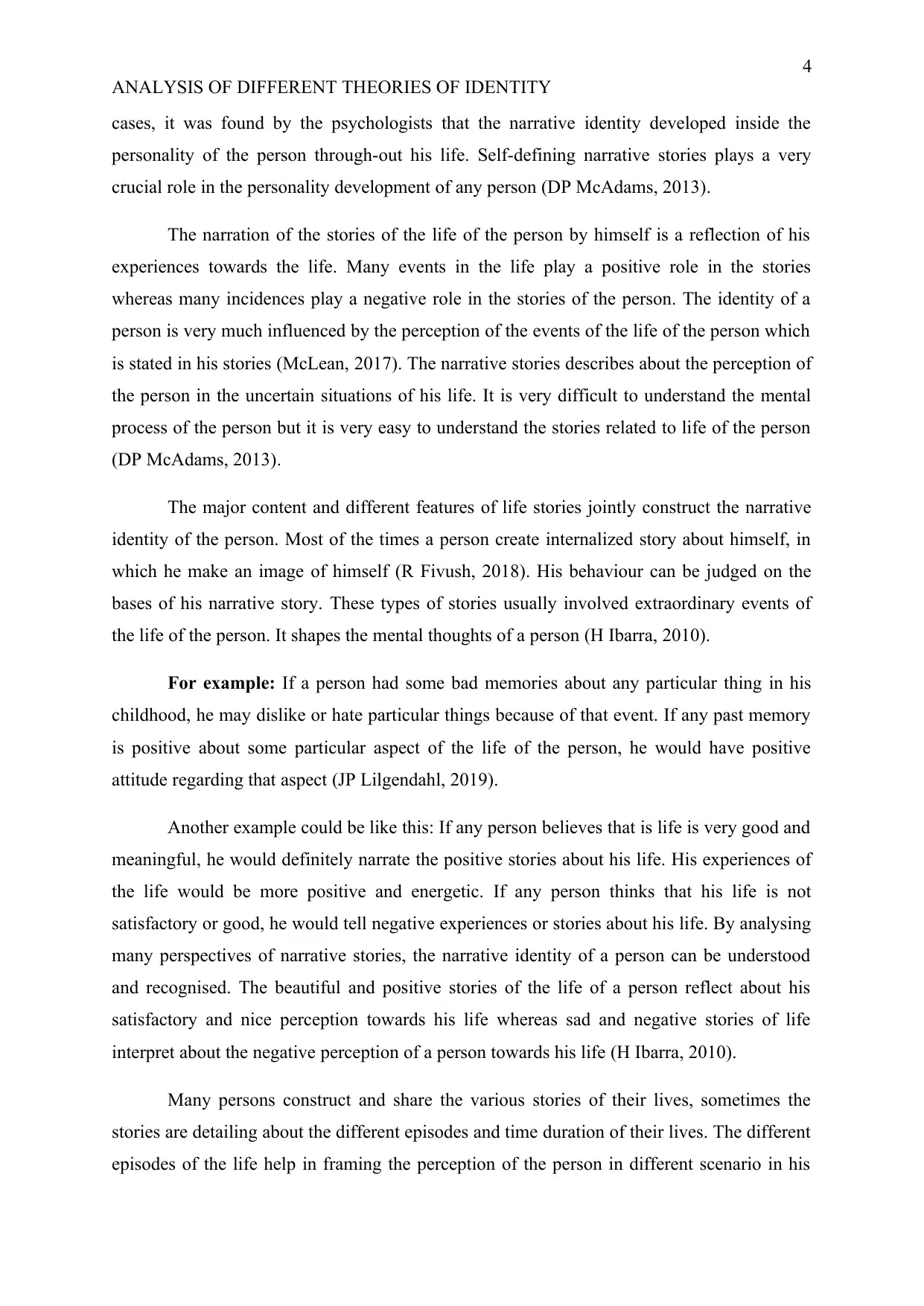
4
ANALYSIS OF DIFFERENT THEORIES OF IDENTITY
cases, it was found by the psychologists that the narrative identity developed inside the
personality of the person through-out his life. Self-defining narrative stories plays a very
crucial role in the personality development of any person (DP McAdams, 2013).
The narration of the stories of the life of the person by himself is a reflection of his
experiences towards the life. Many events in the life play a positive role in the stories
whereas many incidences play a negative role in the stories of the person. The identity of a
person is very much influenced by the perception of the events of the life of the person which
is stated in his stories (McLean, 2017). The narrative stories describes about the perception of
the person in the uncertain situations of his life. It is very difficult to understand the mental
process of the person but it is very easy to understand the stories related to life of the person
(DP McAdams, 2013).
The major content and different features of life stories jointly construct the narrative
identity of the person. Most of the times a person create internalized story about himself, in
which he make an image of himself (R Fivush, 2018). His behaviour can be judged on the
bases of his narrative story. These types of stories usually involved extraordinary events of
the life of the person. It shapes the mental thoughts of a person (H Ibarra, 2010).
For example: If a person had some bad memories about any particular thing in his
childhood, he may dislike or hate particular things because of that event. If any past memory
is positive about some particular aspect of the life of the person, he would have positive
attitude regarding that aspect (JP Lilgendahl, 2019).
Another example could be like this: If any person believes that is life is very good and
meaningful, he would definitely narrate the positive stories about his life. His experiences of
the life would be more positive and energetic. If any person thinks that his life is not
satisfactory or good, he would tell negative experiences or stories about his life. By analysing
many perspectives of narrative stories, the narrative identity of a person can be understood
and recognised. The beautiful and positive stories of the life of a person reflect about his
satisfactory and nice perception towards his life whereas sad and negative stories of life
interpret about the negative perception of a person towards his life (H Ibarra, 2010).
Many persons construct and share the various stories of their lives, sometimes the
stories are detailing about the different episodes and time duration of their lives. The different
episodes of the life help in framing the perception of the person in different scenario in his
ANALYSIS OF DIFFERENT THEORIES OF IDENTITY
cases, it was found by the psychologists that the narrative identity developed inside the
personality of the person through-out his life. Self-defining narrative stories plays a very
crucial role in the personality development of any person (DP McAdams, 2013).
The narration of the stories of the life of the person by himself is a reflection of his
experiences towards the life. Many events in the life play a positive role in the stories
whereas many incidences play a negative role in the stories of the person. The identity of a
person is very much influenced by the perception of the events of the life of the person which
is stated in his stories (McLean, 2017). The narrative stories describes about the perception of
the person in the uncertain situations of his life. It is very difficult to understand the mental
process of the person but it is very easy to understand the stories related to life of the person
(DP McAdams, 2013).
The major content and different features of life stories jointly construct the narrative
identity of the person. Most of the times a person create internalized story about himself, in
which he make an image of himself (R Fivush, 2018). His behaviour can be judged on the
bases of his narrative story. These types of stories usually involved extraordinary events of
the life of the person. It shapes the mental thoughts of a person (H Ibarra, 2010).
For example: If a person had some bad memories about any particular thing in his
childhood, he may dislike or hate particular things because of that event. If any past memory
is positive about some particular aspect of the life of the person, he would have positive
attitude regarding that aspect (JP Lilgendahl, 2019).
Another example could be like this: If any person believes that is life is very good and
meaningful, he would definitely narrate the positive stories about his life. His experiences of
the life would be more positive and energetic. If any person thinks that his life is not
satisfactory or good, he would tell negative experiences or stories about his life. By analysing
many perspectives of narrative stories, the narrative identity of a person can be understood
and recognised. The beautiful and positive stories of the life of a person reflect about his
satisfactory and nice perception towards his life whereas sad and negative stories of life
interpret about the negative perception of a person towards his life (H Ibarra, 2010).
Many persons construct and share the various stories of their lives, sometimes the
stories are detailing about the different episodes and time duration of their lives. The different
episodes of the life help in framing the perception of the person in different scenario in his
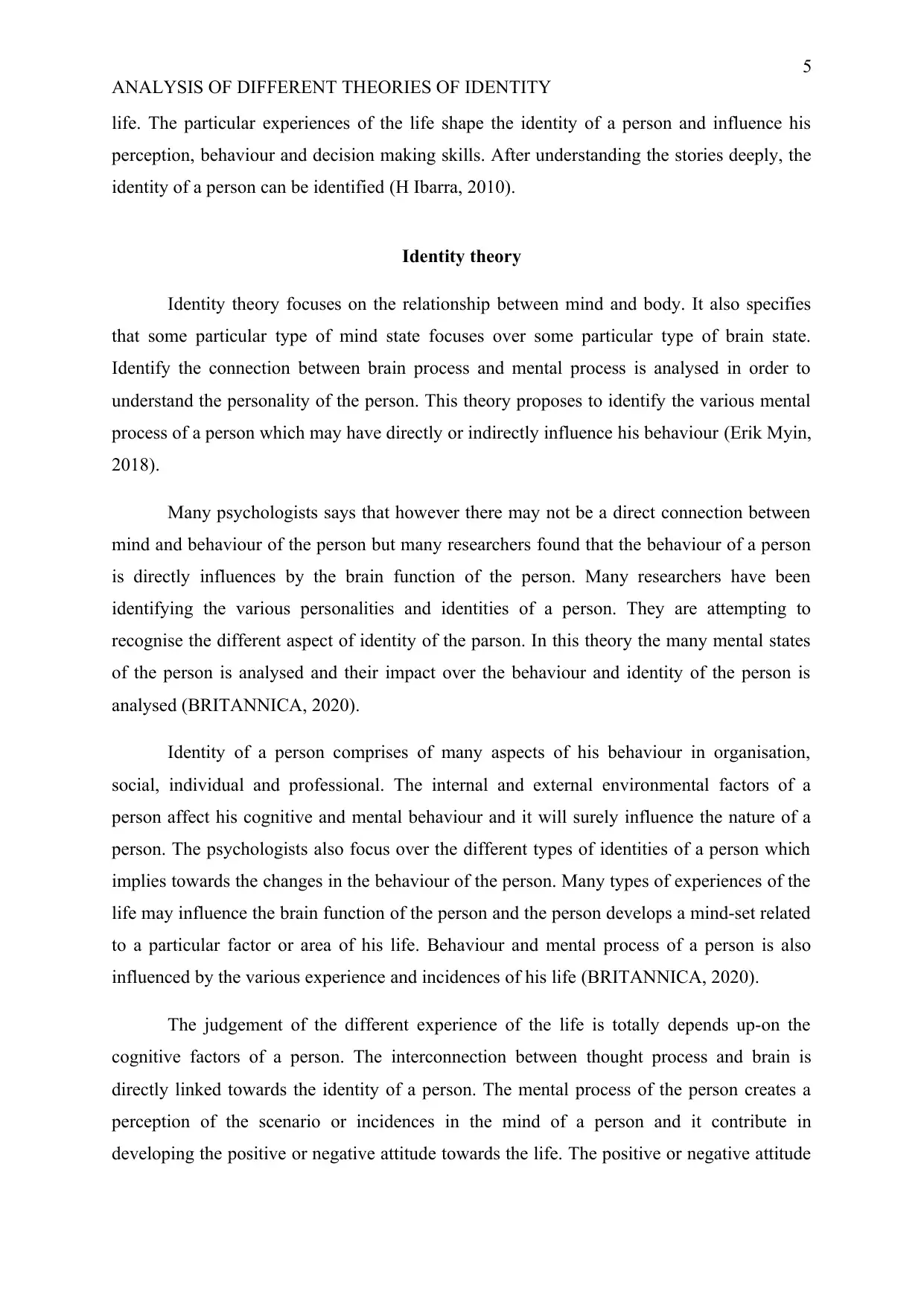
5
ANALYSIS OF DIFFERENT THEORIES OF IDENTITY
life. The particular experiences of the life shape the identity of a person and influence his
perception, behaviour and decision making skills. After understanding the stories deeply, the
identity of a person can be identified (H Ibarra, 2010).
Identity theory
Identity theory focuses on the relationship between mind and body. It also specifies
that some particular type of mind state focuses over some particular type of brain state.
Identify the connection between brain process and mental process is analysed in order to
understand the personality of the person. This theory proposes to identify the various mental
process of a person which may have directly or indirectly influence his behaviour (Erik Myin,
2018).
Many psychologists says that however there may not be a direct connection between
mind and behaviour of the person but many researchers found that the behaviour of a person
is directly influences by the brain function of the person. Many researchers have been
identifying the various personalities and identities of a person. They are attempting to
recognise the different aspect of identity of the parson. In this theory the many mental states
of the person is analysed and their impact over the behaviour and identity of the person is
analysed (BRITANNICA, 2020).
Identity of a person comprises of many aspects of his behaviour in organisation,
social, individual and professional. The internal and external environmental factors of a
person affect his cognitive and mental behaviour and it will surely influence the nature of a
person. The psychologists also focus over the different types of identities of a person which
implies towards the changes in the behaviour of the person. Many types of experiences of the
life may influence the brain function of the person and the person develops a mind-set related
to a particular factor or area of his life. Behaviour and mental process of a person is also
influenced by the various experience and incidences of his life (BRITANNICA, 2020).
The judgement of the different experience of the life is totally depends up-on the
cognitive factors of a person. The interconnection between thought process and brain is
directly linked towards the identity of a person. The mental process of the person creates a
perception of the scenario or incidences in the mind of a person and it contribute in
developing the positive or negative attitude towards the life. The positive or negative attitude
ANALYSIS OF DIFFERENT THEORIES OF IDENTITY
life. The particular experiences of the life shape the identity of a person and influence his
perception, behaviour and decision making skills. After understanding the stories deeply, the
identity of a person can be identified (H Ibarra, 2010).
Identity theory
Identity theory focuses on the relationship between mind and body. It also specifies
that some particular type of mind state focuses over some particular type of brain state.
Identify the connection between brain process and mental process is analysed in order to
understand the personality of the person. This theory proposes to identify the various mental
process of a person which may have directly or indirectly influence his behaviour (Erik Myin,
2018).
Many psychologists says that however there may not be a direct connection between
mind and behaviour of the person but many researchers found that the behaviour of a person
is directly influences by the brain function of the person. Many researchers have been
identifying the various personalities and identities of a person. They are attempting to
recognise the different aspect of identity of the parson. In this theory the many mental states
of the person is analysed and their impact over the behaviour and identity of the person is
analysed (BRITANNICA, 2020).
Identity of a person comprises of many aspects of his behaviour in organisation,
social, individual and professional. The internal and external environmental factors of a
person affect his cognitive and mental behaviour and it will surely influence the nature of a
person. The psychologists also focus over the different types of identities of a person which
implies towards the changes in the behaviour of the person. Many types of experiences of the
life may influence the brain function of the person and the person develops a mind-set related
to a particular factor or area of his life. Behaviour and mental process of a person is also
influenced by the various experience and incidences of his life (BRITANNICA, 2020).
The judgement of the different experience of the life is totally depends up-on the
cognitive factors of a person. The interconnection between thought process and brain is
directly linked towards the identity of a person. The mental process of the person creates a
perception of the scenario or incidences in the mind of a person and it contribute in
developing the positive or negative attitude towards the life. The positive or negative attitude
⊘ This is a preview!⊘
Do you want full access?
Subscribe today to unlock all pages.

Trusted by 1+ million students worldwide
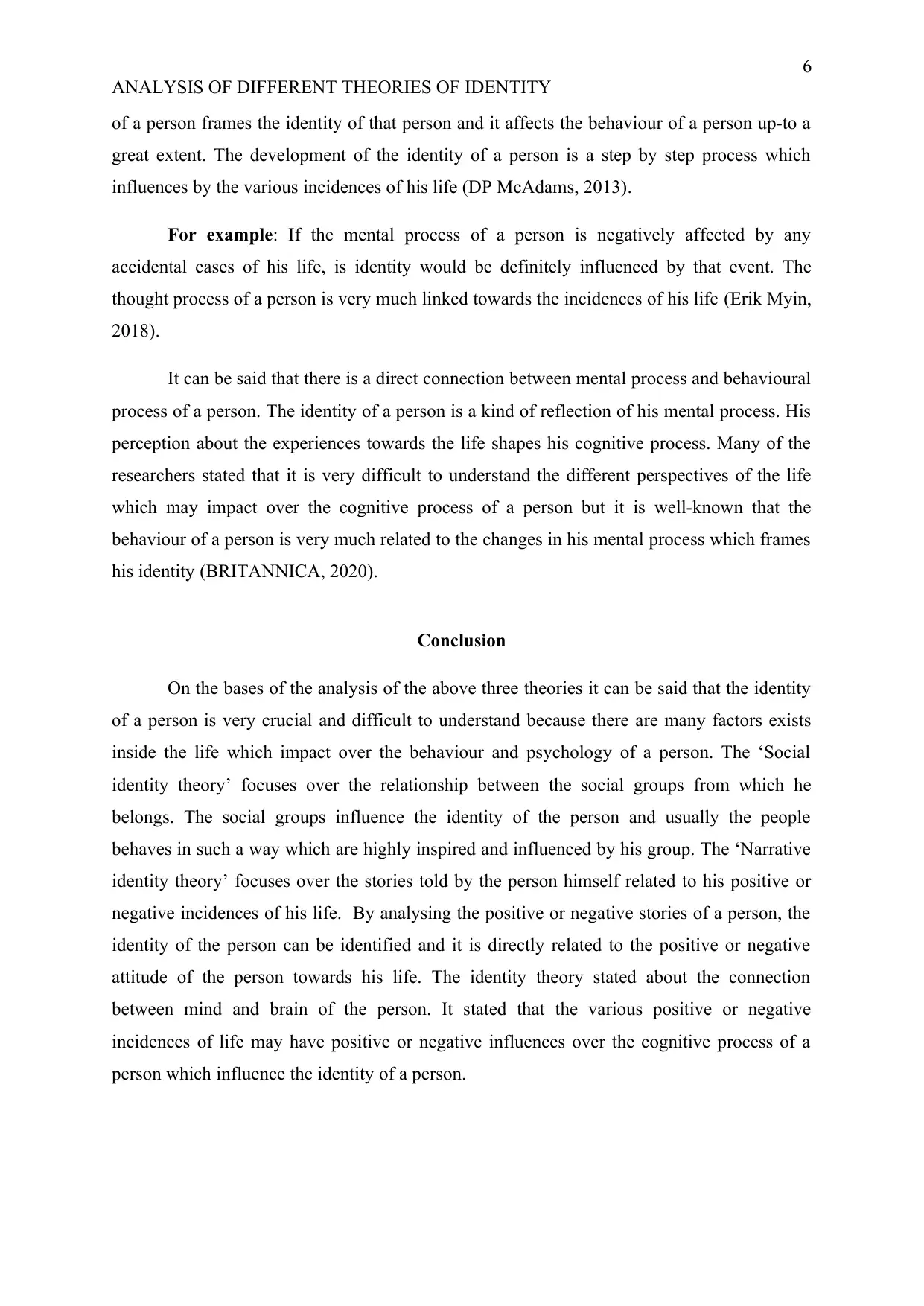
6
ANALYSIS OF DIFFERENT THEORIES OF IDENTITY
of a person frames the identity of that person and it affects the behaviour of a person up-to a
great extent. The development of the identity of a person is a step by step process which
influences by the various incidences of his life (DP McAdams, 2013).
For example: If the mental process of a person is negatively affected by any
accidental cases of his life, is identity would be definitely influenced by that event. The
thought process of a person is very much linked towards the incidences of his life (Erik Myin,
2018).
It can be said that there is a direct connection between mental process and behavioural
process of a person. The identity of a person is a kind of reflection of his mental process. His
perception about the experiences towards the life shapes his cognitive process. Many of the
researchers stated that it is very difficult to understand the different perspectives of the life
which may impact over the cognitive process of a person but it is well-known that the
behaviour of a person is very much related to the changes in his mental process which frames
his identity (BRITANNICA, 2020).
Conclusion
On the bases of the analysis of the above three theories it can be said that the identity
of a person is very crucial and difficult to understand because there are many factors exists
inside the life which impact over the behaviour and psychology of a person. The ‘Social
identity theory’ focuses over the relationship between the social groups from which he
belongs. The social groups influence the identity of the person and usually the people
behaves in such a way which are highly inspired and influenced by his group. The ‘Narrative
identity theory’ focuses over the stories told by the person himself related to his positive or
negative incidences of his life. By analysing the positive or negative stories of a person, the
identity of the person can be identified and it is directly related to the positive or negative
attitude of the person towards his life. The identity theory stated about the connection
between mind and brain of the person. It stated that the various positive or negative
incidences of life may have positive or negative influences over the cognitive process of a
person which influence the identity of a person.
ANALYSIS OF DIFFERENT THEORIES OF IDENTITY
of a person frames the identity of that person and it affects the behaviour of a person up-to a
great extent. The development of the identity of a person is a step by step process which
influences by the various incidences of his life (DP McAdams, 2013).
For example: If the mental process of a person is negatively affected by any
accidental cases of his life, is identity would be definitely influenced by that event. The
thought process of a person is very much linked towards the incidences of his life (Erik Myin,
2018).
It can be said that there is a direct connection between mental process and behavioural
process of a person. The identity of a person is a kind of reflection of his mental process. His
perception about the experiences towards the life shapes his cognitive process. Many of the
researchers stated that it is very difficult to understand the different perspectives of the life
which may impact over the cognitive process of a person but it is well-known that the
behaviour of a person is very much related to the changes in his mental process which frames
his identity (BRITANNICA, 2020).
Conclusion
On the bases of the analysis of the above three theories it can be said that the identity
of a person is very crucial and difficult to understand because there are many factors exists
inside the life which impact over the behaviour and psychology of a person. The ‘Social
identity theory’ focuses over the relationship between the social groups from which he
belongs. The social groups influence the identity of the person and usually the people
behaves in such a way which are highly inspired and influenced by his group. The ‘Narrative
identity theory’ focuses over the stories told by the person himself related to his positive or
negative incidences of his life. By analysing the positive or negative stories of a person, the
identity of the person can be identified and it is directly related to the positive or negative
attitude of the person towards his life. The identity theory stated about the connection
between mind and brain of the person. It stated that the various positive or negative
incidences of life may have positive or negative influences over the cognitive process of a
person which influence the identity of a person.
Paraphrase This Document
Need a fresh take? Get an instant paraphrase of this document with our AI Paraphraser
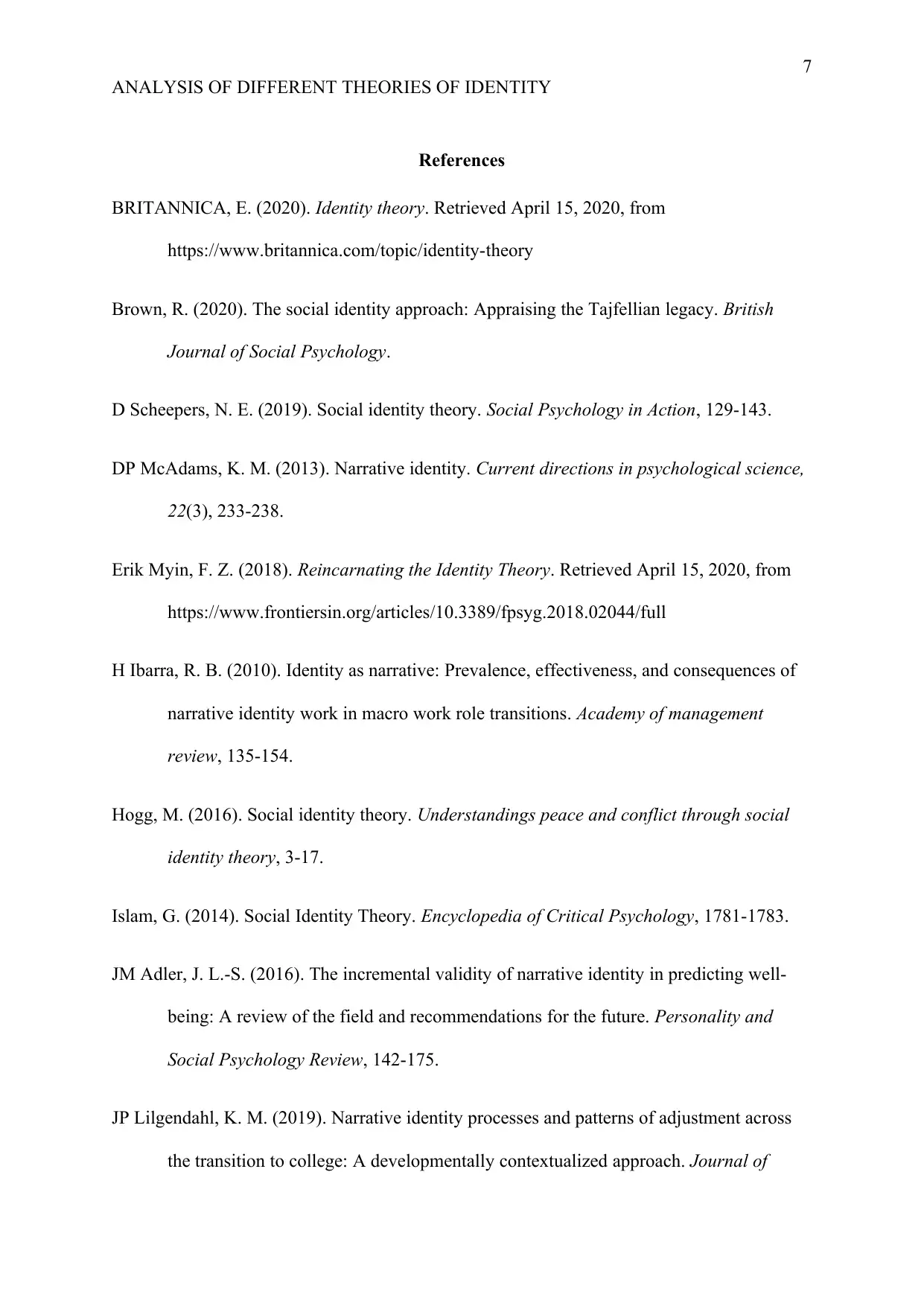
7
ANALYSIS OF DIFFERENT THEORIES OF IDENTITY
References
BRITANNICA, E. (2020). Identity theory. Retrieved April 15, 2020, from
https://www.britannica.com/topic/identity-theory
Brown, R. (2020). The social identity approach: Appraising the Tajfellian legacy. British
Journal of Social Psychology.
D Scheepers, N. E. (2019). Social identity theory. Social Psychology in Action, 129-143.
DP McAdams, K. M. (2013). Narrative identity. Current directions in psychological science,
22(3), 233-238.
Erik Myin, F. Z. (2018). Reincarnating the Identity Theory. Retrieved April 15, 2020, from
https://www.frontiersin.org/articles/10.3389/fpsyg.2018.02044/full
H Ibarra, R. B. (2010). Identity as narrative: Prevalence, effectiveness, and consequences of
narrative identity work in macro work role transitions. Academy of management
review, 135-154.
Hogg, M. (2016). Social identity theory. Understandings peace and conflict through social
identity theory, 3-17.
Islam, G. (2014). Social Identity Theory. Encyclopedia of Critical Psychology, 1781-1783.
JM Adler, J. L.-S. (2016). The incremental validity of narrative identity in predicting well-
being: A review of the field and recommendations for the future. Personality and
Social Psychology Review, 142-175.
JP Lilgendahl, K. M. (2019). Narrative identity processes and patterns of adjustment across
the transition to college: A developmentally contextualized approach. Journal of
ANALYSIS OF DIFFERENT THEORIES OF IDENTITY
References
BRITANNICA, E. (2020). Identity theory. Retrieved April 15, 2020, from
https://www.britannica.com/topic/identity-theory
Brown, R. (2020). The social identity approach: Appraising the Tajfellian legacy. British
Journal of Social Psychology.
D Scheepers, N. E. (2019). Social identity theory. Social Psychology in Action, 129-143.
DP McAdams, K. M. (2013). Narrative identity. Current directions in psychological science,
22(3), 233-238.
Erik Myin, F. Z. (2018). Reincarnating the Identity Theory. Retrieved April 15, 2020, from
https://www.frontiersin.org/articles/10.3389/fpsyg.2018.02044/full
H Ibarra, R. B. (2010). Identity as narrative: Prevalence, effectiveness, and consequences of
narrative identity work in macro work role transitions. Academy of management
review, 135-154.
Hogg, M. (2016). Social identity theory. Understandings peace and conflict through social
identity theory, 3-17.
Islam, G. (2014). Social Identity Theory. Encyclopedia of Critical Psychology, 1781-1783.
JM Adler, J. L.-S. (2016). The incremental validity of narrative identity in predicting well-
being: A review of the field and recommendations for the future. Personality and
Social Psychology Review, 142-175.
JP Lilgendahl, K. M. (2019). Narrative identity processes and patterns of adjustment across
the transition to college: A developmentally contextualized approach. Journal of
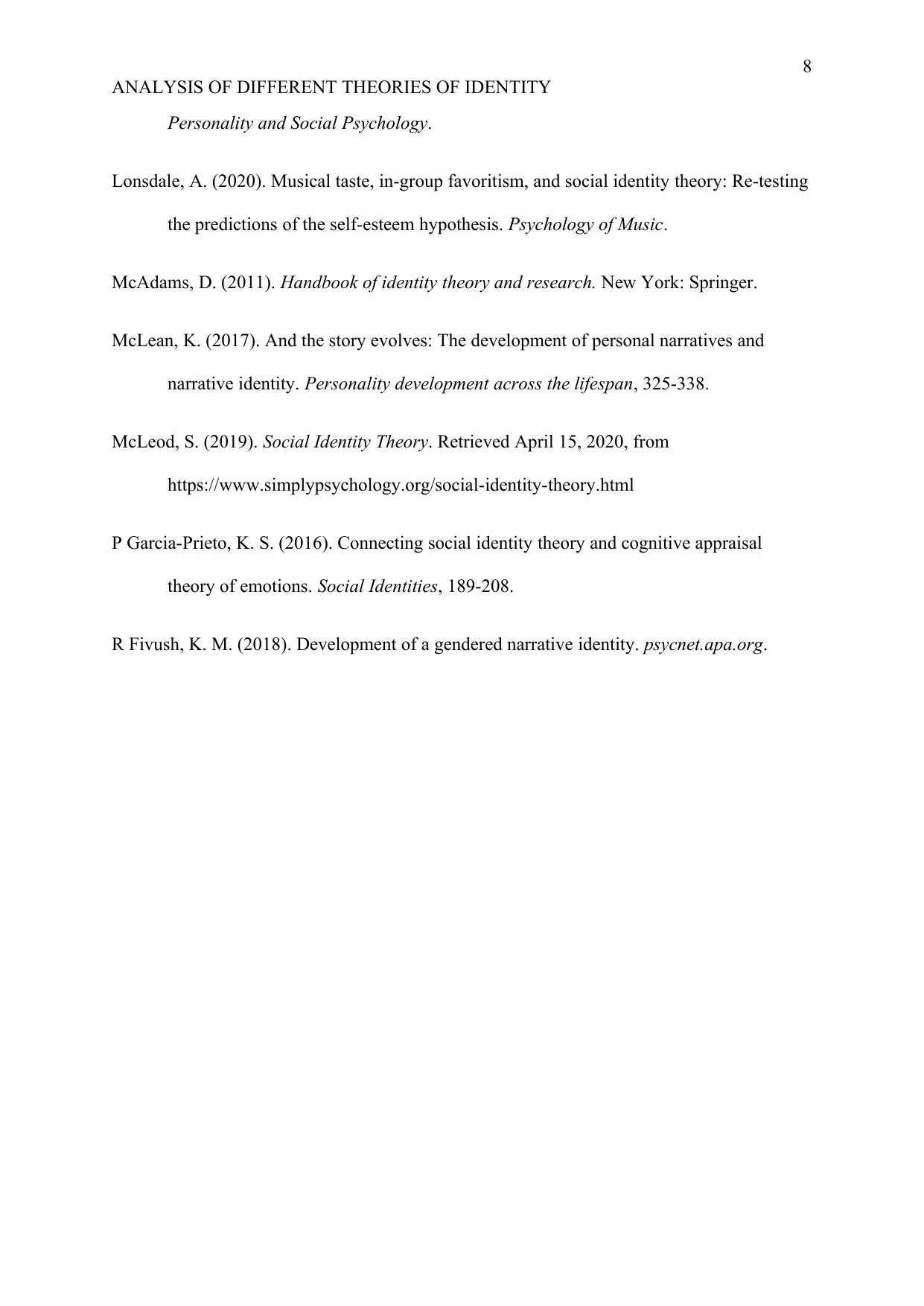
8
ANALYSIS OF DIFFERENT THEORIES OF IDENTITY
Personality and Social Psychology.
Lonsdale, A. (2020). Musical taste, in-group favoritism, and social identity theory: Re-testing
the predictions of the self-esteem hypothesis. Psychology of Music.
McAdams, D. (2011). Handbook of identity theory and research. New York: Springer.
McLean, K. (2017). And the story evolves: The development of personal narratives and
narrative identity. Personality development across the lifespan, 325-338.
McLeod, S. (2019). Social Identity Theory. Retrieved April 15, 2020, from
https://www.simplypsychology.org/social-identity-theory.html
P Garcia-Prieto, K. S. (2016). Connecting social identity theory and cognitive appraisal
theory of emotions. Social Identities, 189-208.
R Fivush, K. M. (2018). Development of a gendered narrative identity. psycnet.apa.org.
ANALYSIS OF DIFFERENT THEORIES OF IDENTITY
Personality and Social Psychology.
Lonsdale, A. (2020). Musical taste, in-group favoritism, and social identity theory: Re-testing
the predictions of the self-esteem hypothesis. Psychology of Music.
McAdams, D. (2011). Handbook of identity theory and research. New York: Springer.
McLean, K. (2017). And the story evolves: The development of personal narratives and
narrative identity. Personality development across the lifespan, 325-338.
McLeod, S. (2019). Social Identity Theory. Retrieved April 15, 2020, from
https://www.simplypsychology.org/social-identity-theory.html
P Garcia-Prieto, K. S. (2016). Connecting social identity theory and cognitive appraisal
theory of emotions. Social Identities, 189-208.
R Fivush, K. M. (2018). Development of a gendered narrative identity. psycnet.apa.org.
⊘ This is a preview!⊘
Do you want full access?
Subscribe today to unlock all pages.

Trusted by 1+ million students worldwide
1 out of 9
Related Documents
Your All-in-One AI-Powered Toolkit for Academic Success.
+13062052269
info@desklib.com
Available 24*7 on WhatsApp / Email
![[object Object]](/_next/static/media/star-bottom.7253800d.svg)
Unlock your academic potential
Copyright © 2020–2026 A2Z Services. All Rights Reserved. Developed and managed by ZUCOL.





